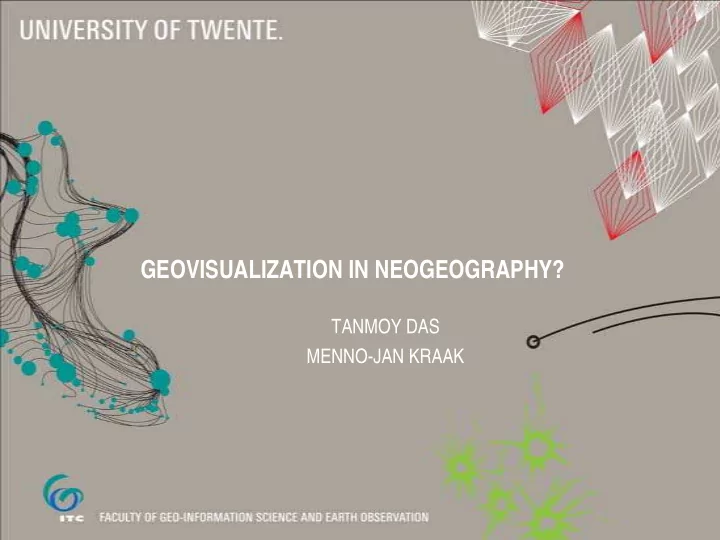

GEOVISUALIZATION IN NEOGEOGRAPHY? TANMOY DAS MENNO-JAN KRAAK
CONTENTS Introduction Terminology Potential Applications Problems Methods Conclusions
INTRODUCTION Applications of Web 2.0 Photo & Video Blogs, Tweets Social Networking Wikis Community Mapping Tagging Sharing Wikipedia, Tag Maps, Blogger, Twitter Facebook, Orkut Google Map, OSM Flickr & YouTube WikiTravel Geonames User-Generated User-Generated + Location Geo-Content Content (UGC) (UGGC)
TERMINOLOGY Top UGGC Layer(s) Map Mashup Base Base Map Layer(s)
POTENTIAL APPLICATIONS Environmental Monitoring Global Citizen Science Patchwork Disaster Response
PROBLEMS Credibility & Quality Geovisualization a) Base Layer (s) b) Top Layer (s)
METHODS Summarizing Compare GeoVis Neo. Map 1A Method 1 Neo. Map 1B Neo. Map 2A Method 2 Neo. Map 2B Compare
METHOD 1 & RESULT K-means Spatial Clustering on Flickr Data from Enschede, Netherlands
METHOD 2 & RESULT S-T Clustering using Kulldorf’s Scan Statistics on Swine Flu Data from USA Locations of swine flu recorded ‘Time’ attribute No ‘spatial’ and ‘temporal’ pattern Space-Time Clusters Size indicates cluster’s radius Colour indicates time period
CONCLUSIONS Not trusted due to poor geovisulization and lack of credibility & quality Neogeography maps are cluttered at certain scale (zoom level) Clustering might be one of solutions to remove clutter Both Space and S-T clustering can be used Limitations of Clustering Improved GeoVis does not solve the problem of credibility & quality User’s requirement analysis is required Clustering techniques are professional. Challenge is to implement them within neogeography domain.
Recommend
More recommend